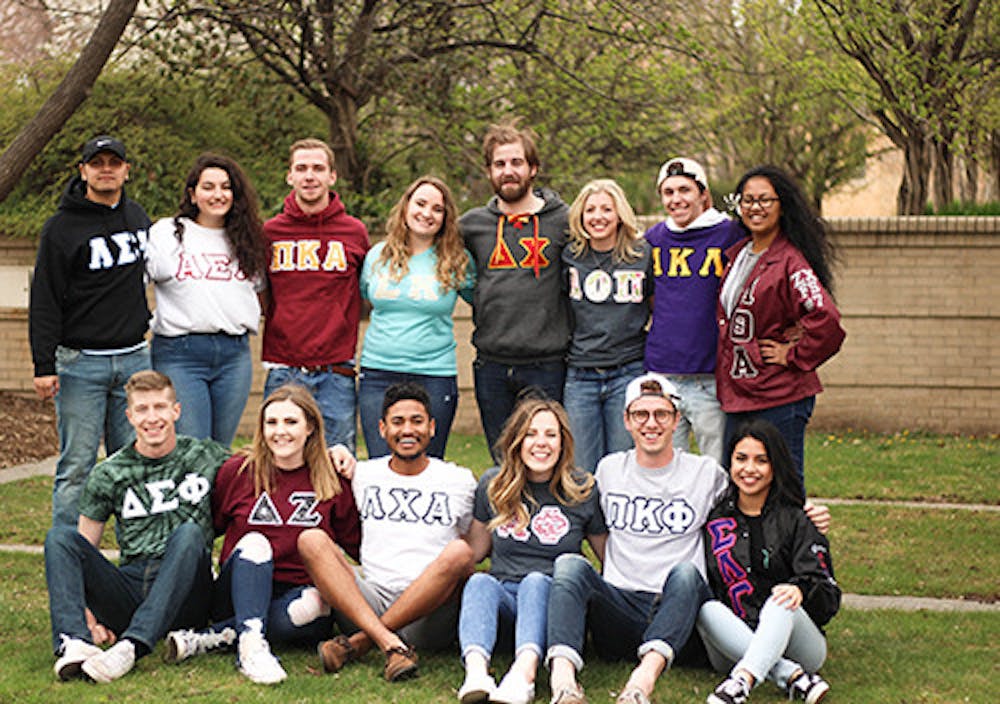There are a plethora of considerations that a high school senior makes when considering what college to apply to. What majors does a school offer? Is it in state or out of state? Public or private? And does the school offer Greek life?
For students who are looking forward to the experience of joining a fraternity or sorority in college, the University of Northern Colorado might not be the first choice. On Niche, a social media site that allows college students to rate their schools, UNC falls behind University of Colorado Boulder, University of Denver and Colorado State University in both quality and quantity of Greek life experiences. Around campus, UNC isn’t considered a party school, and more often than not, Greek life gets a bad rap.

Stereotypically, fraternity and sorority members are raucous party people, more focused on the social part of college than the education they’re getting. A hungover 19 year old in sunglasses and backwards baseball cap is an image that comes to mind for many when presented with the idea of a “frat boy,” including Katelyn Garrett, a UNC senior majoring in environmental and sustainability studies. But she says that even her own preconceptions might not be accurate.
“I always think about the stereotypical college party scene, but I’ve also known people involved in Greek life who were really involved in charity work,” Garrett said. “So there’s more than one type of person involved in it.”
One UNC community member working to fight the negative stereotypes of Greek life on campus is Dane MillerHass, a junior business management major, who is the president of the school’s Interfraternity Council. He says he wasn’t interested in Greek life when he first came to UNC, but he had some friends who were. Through joining them at events, he discovered a robust and meaningful community. Like Garrett, he discovered that his preconceptions about Greek life weren’t entirely accurate.
“I think at UNC, being a smaller school, we have a little bit more of a positive reputation,” MillerHass said. “We try to present the best image of community service and campus involvement.”
Garrett’s perception of UNC’s Greek life was similar. Before she attended UNC, she was a student at CSU, and she says that Greek life was a lot more prominent at her first school. At CSU, her roommate was in a sorority and she heard about parties at frat houses nearly every weekend, but at UNC she’s had very little interaction with Greek life at all. She says the only time she ever heard about Greek life was in 2018, when the university temporarily paused Greek life activities on campus during the spring semester.
The cause of this administration-enforced hiatus came in the form of allegations of sexual misconduct, drug use and underage drinking across multiple fraternities and sororities. At the heart of the issue was the Sigma Chi fraternity, several members of which had violated sexual harassment, discrimination and possession of alcohol policies. The fraternity was suspended from campus for seven years, and the Delta Tau Delta fraternity followed suit later that year with a five year suspension.

MillerHass stepped into his role as IFC president long after the Greek life pause and suspensions, but he’s found that the resulting negative image of Greek life has persisted. He wants students like Garrett to become more aware of Greek life on campus through positive experiences that he hopes will combat negative stereotypes. He and other members of the IFC create campus-wide events meant to help members of the community keep themselves and others safe. They’ve hosted trainings on topics such as personal finance and social safety, and they bring in representatives of the Assault Survivors Advocacy Program to help make fraternity and sorority experiences as safe as possible.
In the case that allegations of policy violations would arise again, MillerHass says the IFC would work closely with the Title IX office on campus, as well as UNC police and Greeley police, to take appropriate corrective action. Depending on the offense, this action can range from a formal warning to a suspension of all fraternity activities like in the case of Sigma Chi. The IFC and Panhellenic council also has its own judicial system, and members work hard to keep their peers accountable.
“If there is something that’s not okay, we want to make sure that they are removed from the system so that person is no longer part of our community,” MillerHass said. “We don’t want to be represented like that, and we want everyone to feel safe in our community.”
In his time as IFC president, MillerHass hasn’t had to take disciplinary action against anyone in the Greek life community. He says that his experience has been largely positive, and he counts himself lucky to be a part of an on-campus organization that cares so much about its surrounding community. He especially values their focus on philanthropy - each fraternity and sorority chapter hosts a week of events to support a chosen charity, and he’s had the chance to work with organizations like the Humane Society and the Weld County Food Bank.
Students who are interested in learning more about UNC’s Greek life opportunities can visit https://www.unco.edu/fraternity-sorority/ .







